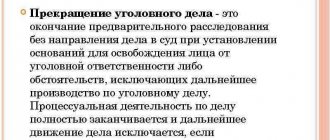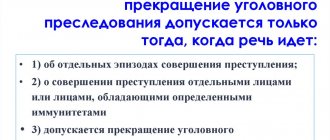06.12.2017
You need to know your rights in order to be able to defend them. All fears and doubts recede in the light of knowledge. Even if it happened that you or a loved one was accused of a crime that you did not commit, and a criminal case was opened, not all is lost. You need to act armed with knowledge of the law.
Serious crimes, for which liability is provided under an article of the Criminal Code of the Russian Federation, usually require a more labor-intensive investigation than less serious violations. Therefore, cessation of production is a natural process. And opening a case, contrary to public opinion, does not mean guilt.
Termination of criminal prosecution is also possible at the stage of consideration of the case in court under Art. 25,25,1, 28. If you are ready to compensate for the damage and cooperate with the investigation, the accused needs to take the initiative - write a statement.
Procedure for terminating a criminal case:
- Preparation of a written resolution strictly within the time limits established by law (provided for inquiry and preliminary investigation).
- Transferring a copy of the decision to the accused.
- Carrying out work established by law with victims: informing about the right to appeal, the right to file a civil claim, explaining the appeal procedure.
- In some cases, it is necessary to notify the tax authorities (Articles 198.199.1).
- Sending a copy of the document to the regulatory authority (prosecutor's office).
Grounds for termination of a criminal case
The grounds on which a criminal case and criminal prosecution can be terminated are reflected in Art. 212 Code of Criminal Procedure. Under the same article, a refusal to initiate a case is issued based on the results of a preliminary inspection.
Absence of a fact (event) of a criminal act
If during the investigative actions it turns out that the information about the act was unreliable, since, for example, a murder did not take place. Or there is no reason to believe that it took place. Termination under this article is also carried out in the case where the event did occur, but there cannot be a guilty person. For example, if death occurred as a result of being struck by lightning.
Absence of corpus delicti in the committed actions
Criminal proceedings are terminated due to the absence of corpus delicti if not all elements of the corpus delicti are present.
The composition of a criminal act includes 4 mandatory elements: the object and the objective side, the subject and the subjective side. If at least one of them is missing, then we can talk about the absence of a crime. For example, if the perpetrator of the theft is a minor, then there is no subject. If the destruction of someone else's property did not lead to significant damage, then there is no objective side.
If a criminal case was initiated on suspicion of fraud, since the suspected person was selling counterfeit jewelry, then in the absence of victims (violation of property rights), we can say that there is no object of the crime.
- The subjective side is understood as criminal intent or negligence. For example, if the person selling counterfeit jewelry did not know about it, then we can talk about the absence of a subjective side. Any of us may have counterfeit banknotes in our hands, but not everyone can determine the authenticity, even if the signs of counterfeiting are obvious to a healthy person with good eyesight.
This category (lack of corpus delicti) includes a wide group of acts.
Minor actions
- First of all, this group includes actions that do not pose a public danger. For example, stealing 1 small coin. Here, formally, all the signs of a crime are present, but most often the harm is so insignificant that it is too cruel to prosecute for it under a serious crime. This does not mean that a person cannot be held liable under another article, for example administrative. So, if ten rubles were stolen from an elderly person as a joke, then there are grounds for prosecution for actions of a hooligan nature.
In qualifying the actions of the accused under this article, motive is of great importance. For example, the theft of an inexpensive cigarette case by a fan of a great tenor is in itself insignificant. Charges of theft are out of the question. But if these actions were accompanied, say, by entering the dressing room, where, as the “fan” expected, there would be more expensive things, then there are grounds for charges of attempted theft.
The action is no longer punishable
Under this paragraph of the article, termination is most often carried out when it comes to financial and economic activities. For example, in the USSR, trading in foreign currency was a serious crime. But time passed, and these actions ceased not only to be punished, but also to be condemned in society. Now it is as natural as buying real estate and cars.
If a person does not agree with the termination of the investigation, because in his eyes this accusation is shameful, then he can insist on completing the investigation. He has this right. The investigation will continue at the request of the accused. The final decision on guilt or innocence will be made by the court.
Actions were necessary in certain circumstances
Aggressive actions for the greater good, when they are truly necessary, are not punished by law, but require careful investigation. An example is self-defense. A person has the right to defend himself. However, it is first necessary to establish whether the person has not exceeded the necessary (required for self-defense) self-defense.
If the action is aggressive, was necessary, but excessive, then criminal proceedings may be initiated. Thus, the use of firearms available at home may be justified if the offender also came with a weapon, does not respond to warnings and behaves aggressively. However, a shot in the head, and not, say, in the leg, must have good reasons.
This category also includes causing harm by a law enforcement officer when detaining a criminal, acting under duress, or executing an order.
From this list, special attention should be paid to two paragraphs of Art. 8 of the Criminal Code: justified risk on the way to a socially useful goal and extreme necessity. In the first case, a person takes risks in order to avoid danger. It is not always directly present. But there must be a possibility. For example, when testing a new type of fighter, a pilot may harm someone else's property by landing the plane on it.
A car breakdown poses a threat to the life of the pilot and surrounding residents. However, the malfunction does not have to be such that there is a threat of loss of life. The extreme necessity is to act in conditions of direct threat, for example, when the plane is already falling.
Failure of an accused to appear in a private prosecution case
If the victim has applied to law enforcement agencies with a request for assistance in collecting evidence under an article that relates to a private prosecution, as well as with a lawsuit in court, then certain responsibilities are imposed on the victim. He must be present in court. The failure of the injured person to appear entails the termination of the criminal case (Code of Criminal Procedure of the Russian Federation). The exception is when the plaintiff has valid reasons. This norm is prescribed in Art. 249 Code of Criminal Procedure.
Expiration of statute of limitations
If during a period of time equal to the statute of limitations under this article, the guilty person has not been brought to justice, then the case must be dismissed. But the accused person may resist termination if he wants to restore in the eyes of others the reputation that has suffered as a result of suspicion of a crime. In this case, the investigative authorities and the court are obliged to complete the case.
Termination of a case due to the expiration of the statute of limitations within the time limits established by law is possible only if the accused person did not interfere with the conduct of investigative actions. If the suspect is hiding from the investigative authorities and the court, then the statute of limitations is extended until he turns himself in. Or until the day he is forcibly detained.
In relation to persons who have committed crimes under serious articles providing for life imprisonment, only a court can terminate the case due to the expiration of the statute of limitations. In this case, termination of the criminal case by the prosecutor or investigative authorities is impossible.
Due to the death of the person responsible
If the person who committed the crime died during the investigation or trial, then the criminal case against him must be terminated. Criminal prosecution must also be stopped.
The exception is when it is necessary to rehabilitate someone who has passed away. In this case, the investigation and judicial review will continue until an objective decision is made.
Lack of judicial opinion
When certain senior officials, such as the prosecutor general or the head of the investigative committee, are accused of committing a crime, a special procedure applies. If there is no positive conclusion of the court / consent of the parliament / Constitutional Court / panel of judges, then the law provides for the termination of proceedings.
In connection with the reconciliation of the parties
When committing a crime of no more than average gravity, the guilty person may be released from liability. Necessary conditions for this:
- Reconciliation of the parties (accused and victim with each other).
- No criminal record.
- Compensation for harm caused or taking other actions to make amends.
Termination of the case in court
If the accused has committed a minor crime for the first time, the judicial authority has the right to terminate the criminal case with the imposition of penalties.
Compensation for harm is also an indispensable condition. However, it is allowed for the guilty person to make amends for his guilt in another way.
Active repentance as a basis
The court, as well as investigative bodies, have the right to terminate criminal proceedings under an article of no more than average gravity if the person:
- Committed a crime for the first time (has not previously been prosecuted).
- She repented and confessed (exclusively voluntarily).
- Assisted in the investigation.
- Compensated for the damage.
- Changed behavior and stopped causing harm to society.
All of the above points must be completed simultaneously.
If a more serious crime has been committed, then termination on the basis of repentance is not always possible, but only in cases where the act relates to one of the articles of the “Special Part” of the Criminal Code.
Due to repentance, a person is released from liability under certain conditions. So, if, after being released on these grounds, the perpetrator commits a crime again, he will be held accountable. However, there are two views on this matter in the expert community.
Some experts say that a more severe measure in case of a repeat crime should take place if the statute of limitations under the previous article has not expired. While other interpreters argue that in case of a repeated violation, release under this article is impossible, and this does not depend on the time the act was committed. Unfortunately, modern Russian law has many unclear places that are interpreted ambiguously, which gives rise to many problems.
Crimes of an economic nature
If, as a result of criminal actions, damage is caused to the budget of the Russian Federation, then full fulfillment of one’s financial obligations, including fines and penalties, is sufficient grounds for termination of the case and prosecution.
Committing a crime by a person with diplomatic status
If a person suspected of committing a criminal offense has diplomatic immunity, then the case by law must be terminated under Art. 3 of the same code.
Possibility of rehabilitation
All of the above reasons can be divided into two groups:
- Rehabilitative grounds:
- acquittal by court verdict;
- termination of prosecution due to refusal of charges by the prosecutor's office;
- closure of the case due to the absence of a criminal act;
- due to the non-involvement of a particular person in the crime for which the case was initiated;
- absence of crime event;
- absence of a statement from the victim;
- lack of judicial opinion in cases against senior officials of the law enforcement system.
- Non-rehabilitative grounds:
- amnesty;
- minor age;
- the expiration of the statute of limitations, if we are not talking about a deceased accused;
- reconciliation of the parties.
The right to rehabilitation gives the accused the opportunity not only to justify himself to society, but also to receive compensation for the harm caused. The state is obliged to pay compensation. The guilt of the investigative authorities and the judicial system in this case does not matter. Mistakes by government officials give rise to the right to receive harm. The reason why they arose does not affect the ability to be rehabilitated and receive compensation.
How to submit an application
The current Codes do not set out specific requirements for the structure of a petition to suspend judicial proceedings in a case. Therefore, the document is formed based on generally accepted standards for writing such statements. Its content usually consists of the following parts:
- A cap:
- name and address of the court;
- information about the applicant;
- case number;
- plaintiff's details;
- defendant's details.
- Document's name.
- Content part:
- information about the case (participants, essence);
- indication of the reason why it is necessary to suspend the proceedings;
- legislative and legal basis for the possibility of suspending the progress of the case;
- the essence of the request.
- Applications.
- Date, signature.
If a participant in the case is a legal entity, it is necessary to indicate its full name with its organizational and legal form and legal address
Documents confirming the occurrence of circumstances that objectively affect the activities of the court in the consideration of a specific claim are listed as appendices.
Petition to terminate the criminal case
The accused person can petition for the termination of a criminal case in court or at the investigation stage (to the investigator) in cases provided for by law (described above). You can also apply for termination to the prosecutor.
A lawyer's petition is allowed to protect the interests of his client (accused). But it is advisable to prepare such an appeal only if the investigation lasts a long time and there are serious violations that the supervisory authority cannot ignore without proper justification. It is advisable to provide evidence, such as witness statements, if possible.
Features of the procedure
A request to suspend proceedings may not always be granted. The court makes an appropriate decision based on the specific situation. For example, if there is reason to believe that the claim will be considered within the established time frame, without violating the regulations, then there is no point in suspending it, since in this case it is more logical to choose to postpone the next meeting. If the procedure (for example, searching for the defendant) does not make it possible to determine the exact date of its completion, the petition is granted.
The time periods for which the case may be terminated are fixed in Art. 217 Code of Civil Procedure and Art. 145 Arbitration Procedure Code of the Russian Federation .
The general conclusion from these articles is that proceedings can be resumed only after the circumstances preventing the consideration of the claim have been eliminated.
Resolution to terminate the criminal case
There may be the following grounds for termination of a case:
- Court statement.
- Termination of a criminal case with the imposition of a judicial fine by the court.
- Investigator's resolution.
Depending on the grounds for which the case is closed, the guilty person may be required to submit a statement to terminate the criminal case or consent.
The preparation of the resolution is carried out in accordance with the requirements specified in Art. 213 Code of Criminal Procedure. The law does not have a sample or form of the document, but there are details about what information it must contain.
- date and place where the decision was made;
- data of the responsible person;
- information about persons (accused) who were prosecuted in this case;
- article of the Criminal Code that served as the basis for initiating the case.
- Main (descriptive) part:
- the circumstances on the basis of which the case was initiated;
- the results of the preliminary investigation;
- information about preventive measures, if used;
- information about preventive measures, if used;
- Conclusion. Main part:
- grounds for termination of proceedings - article of the Code of Criminal Procedure;
- decision to cancel special measures applied to the accused (detention, seizure of property, etc.);
- decision regarding physical evidence;
- information about the statement/petition and/or consent of the accused person.
: Resolution to terminate the criminal case
As you can see, there are quite a lot of reasons to protect yourself in case of trouble. Their skillful use can preserve freedom and property. And being one step away from imprisonment in itself is a good incentive not to break the law and to avoid working with people who may encourage them to commit illegal acts and be held accountable for them.
( 1 ratings, average: 5.00 out of 5)
Comments
Cancel reply
Similar articles
What to do if a car is stolen What actions to take if a car is stolen? This is the first question that arises for a panic-stricken owner when he discovers an empty space. The only correct solution is to report...
215
0
April 7, 2017
Marriage contract The social standard that makes contractual relationships in marriage shy is becoming a thing of the past. Now it is customary to agree “on the shore” on the areas of responsibility of the spouses, on the distribution of material wealth...
0
December 4, 2017
In what cases and how can alimony be collected for parents? The situation when alimony is paid for parents is quite rare.
Most often, such payments take place when there are conflicts in the family.
Types of criminal prosecution in 2022
In Russian legislation, the term “criminal prosecution” refers to procedural activities to carry out the function of prosecution. In simpler terms, criminal prosecution in the Russian Federation is the main activity of the prosecution, the purpose of which is to prove the guilt of a suspect in committing a crime.
Depending on the nature and severity of the crime committed, criminal prosecution may be carried out:
In public (for example, robbery or murder)
A criminal case of public prosecution may be initiated by an authorized state body or official (prosecutor, investigator, inquiry agency, interrogator) on its own initiative.
In private-public matters (rape, fraud, etc.)
Criminal cases of private-public prosecution are initiated after the victim contacts law enforcement agencies.
In private (beatings, slander, etc.)
Criminal cases of private prosecution, in turn, are initiated by the victim filing an application directly to the magistrate's court.
In 2022, criminal prosecution in criminal cases of public and private-public prosecution is carried out by: a prosecutor, an investigator and an inquiry officer.




